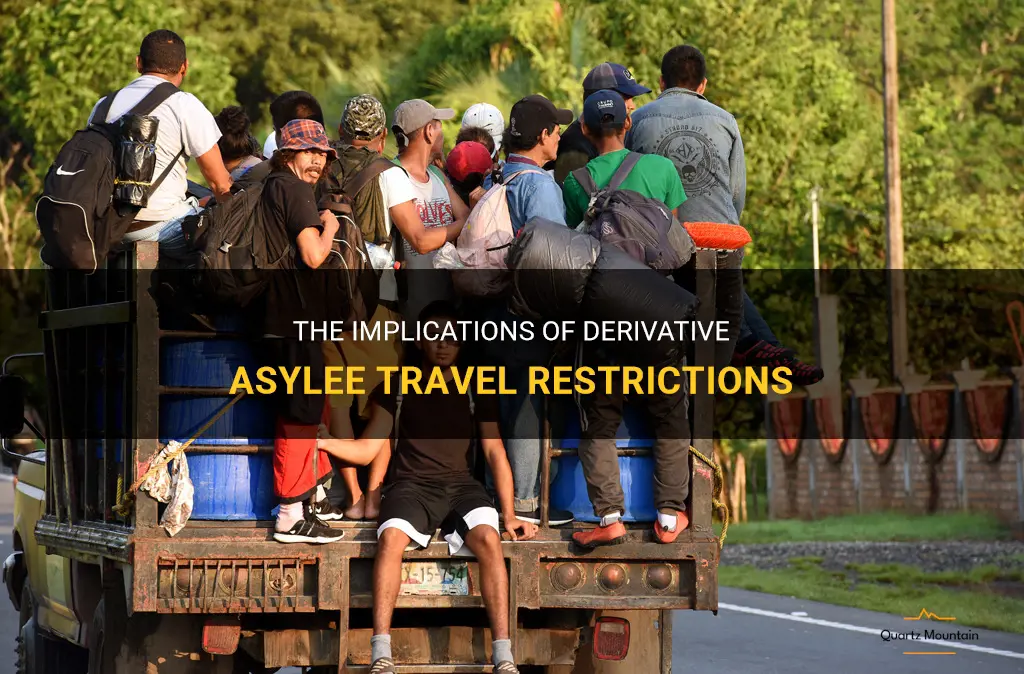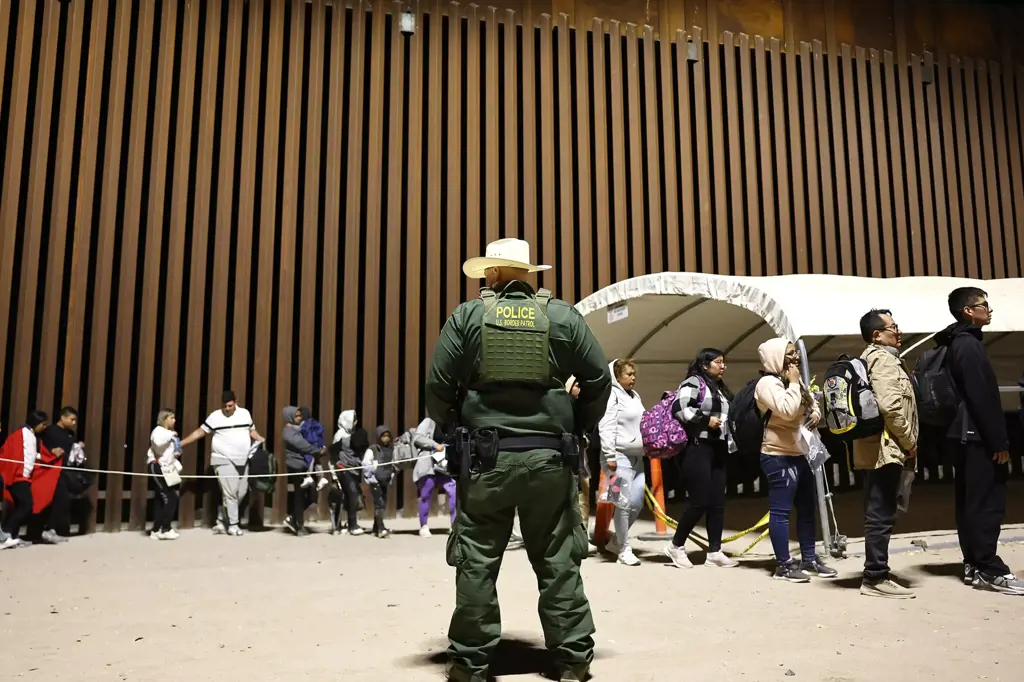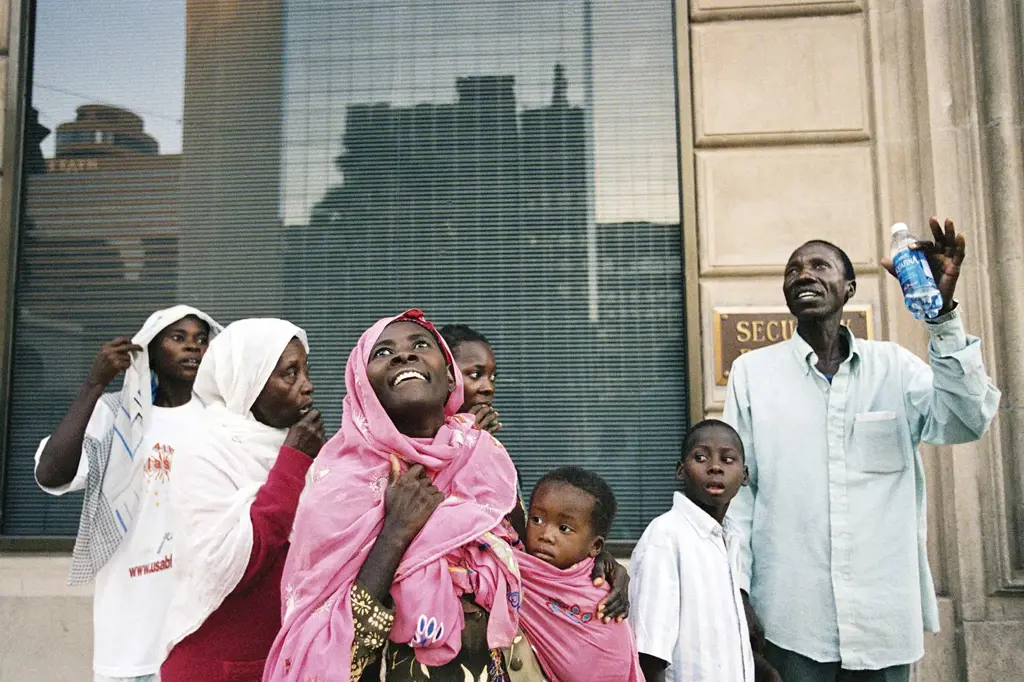
Derivative asylee travel restrictions have become a topic of great debate and controversy in recent years. These restrictions, which limit the ability of family members of asylees to travel, have raised concerns about the impact they may have on individuals seeking safety and refuge in a new country. Proponents argue that these restrictions are necessary to protect national security and prevent fraudulent asylum claims, while critics argue that they unnecessarily separate families and hinder the integration process for those granted asylum. This issue highlights the complex and often conflicting interests at play in immigration policy and raises important questions about how to balance security concerns with the rights and well-being of asylum seekers.
What You'll Learn
- What are derivative asylee travel restrictions?
- What qualifies someone as a derivative asylee?
- How do derivative asylee travel restrictions differ from those for primary asylees?
- What limitations are typically placed on the travel of derivative asylees?
- Are there any exceptions or waivers for derivative asylee travel restrictions?

What are derivative asylee travel restrictions?

Derivative asylee travel restrictions refer to the limitations placed on individuals who have obtained derivative asylum status in the United States. Derivative asylum status is granted to certain family members of the primary asylee who have entered the country together or joined the primary asylee after their grant of asylum.
While derivative asylees have the right to live and work in the United States, they may face certain travel restrictions. These restrictions are put in place by the U.S. government to ensure the integrity of the asylum system and to prevent fraud.
One of the main travel restrictions for derivative asylees is the requirement to obtain permission from the U.S. Citizenship and Immigration Services (USCIS) before traveling outside of the United States. This permission is known as a Refugee Travel Document (RTD) and is similar to a passport. Derivative asylees must apply for an RTD and receive approval before they can leave the country.
The process of obtaining an RTD involves submitting an application to the USCIS and providing supporting documents such as a letter from the primary asylee, proof of identity, and proof of the relationship between the derivative asylee and the primary asylee. The USCIS will review the application and make a determination on whether to grant the RTD.
It is important for derivative asylees to plan their travel in advance and allow sufficient time for the RTD application to be processed. The USCIS recommends submitting the application at least 90 days before the planned departure date. Failure to obtain the necessary permission could result in difficulties re-entering the United States.
In addition to the requirement for an RTD, derivative asylees are also subject to certain restrictions on their travel destinations. The U.S. government maintains a list of countries to which derivative asylees are not allowed to travel without obtaining additional permission. This list includes countries that are considered to pose a national security risk or have strained diplomatic relations with the United States.
Derivative asylees who wish to travel to one of these restricted countries must seek a waiver from the U.S. government. The waiver process involves providing a justification for the travel and demonstrating the absence of any national security concerns. The decision on whether to grant the waiver is made by the relevant U.S. government agency, such as the Department of State or the Department of Homeland Security.
It is important for derivative asylees to understand and comply with these travel restrictions to avoid any legal complications or difficulties when re-entering the United States. Violating the restrictions can have serious consequences, including the loss of immigration benefits and potential removal from the country.
In conclusion, derivative asylee travel restrictions are limitations placed on individuals who have obtained derivative asylum status in the United States. These restrictions include the requirement to obtain a Refugee Travel Document and seek permission to travel to certain restricted countries. It is important for derivative asylees to comply with these restrictions to avoid any legal issues.
Travel Restrictions to Washington State: What You Need to Know
You may want to see also

What qualifies someone as a derivative asylee?

Derivative asylees are individuals who are granted asylum in the United States based on their relationship with the principal asylum applicant. These individuals may include spouses, children, and parents of the principal asylum applicant. To qualify as a derivative asylee, the individual must meet certain criteria and go through the necessary legal process.
One of the main requirements to be considered a derivative asylee is having a qualifying relationship with the principal asylum applicant. This can include being the spouse of the principal applicant, being unmarried children under the age of 21, or being the parent of the principal applicant if they are under the age of 21. The relationship must be legally recognized and documented, such as through a marriage certificate or birth certificate.
Additionally, the derivative asylee must demonstrate a well-founded fear of persecution in their home country based on the same grounds as the principal applicant. This can include persecution based on race, religion, nationality, political opinion, or membership in a particular social group. The derivative asylee must show that they would also face persecution if they were to return to their home country.
Another important requirement for derivative asylees is that they must file their asylum application within one year of their last entry into the United States, unless they can demonstrate exceptional circumstances that justify the delay. This requirement is the same as for principal asylum applicants and is in place to ensure that applications are filed in a timely manner.
To apply for derivative asylum, the individual must complete Form I-730, Refugee/Asylee Relative Petition, and submit it to the United States Citizenship and Immigration Services (USCIS). They may include any supporting documents that demonstrate their qualifying relationship and their well-founded fear of persecution.
If the USCIS approves the application, the derivative asylee will receive a derivative asylee status, which is valid for two years. After that, they can apply for permanent residency (green card) if they continue to meet the eligibility requirements.
It's important to note that derivative asylees have similar rights and benefits as principal asylum applicants. They are allowed to live and work in the United States, and they may be eligible for certain federal and state benefits, such as access to healthcare and assistance programs.
In conclusion, derivative asylees are individuals who are granted asylum in the United States based on their relationship with a principal asylum applicant. They must have a qualifying relationship, demonstrate a well-founded fear of persecution, and meet other eligibility requirements. The process involves filing the necessary forms and supporting documents with the USCIS. Once approved, derivative asylees can live and work in the United States and may be eligible for permanent residency in the future.
Exploring Brazil: Navigating the Current Travel Restrictions in the Land of Samba and Sun
You may want to see also

How do derivative asylee travel restrictions differ from those for primary asylees?

Derivative asylees, sometimes referred to as "asylee derivatives," are individuals who receive their asylum status based on their relationship with the primary asylee. This relationship could be that of a spouse or child. Unlike primary asylees, who are granted asylum based on the fear of persecution in their home country, derivative asylees are afforded certain travel restrictions due to their status. These travel restrictions differ from those for primary asylees.
One major difference is that derivative asylees are generally not allowed to travel outside the United States until they have obtained their green cards. Primary asylees, on the other hand, are typically free to travel outside the country after their asylum application has been approved, as long as certain conditions are met. This restriction for derivative asylees helps to ensure that they remain within the jurisdiction of the United States until they have completed the necessary steps to legalize their status.
Another difference in travel restrictions between derivative and primary asylees is the ability to travel to their home countries. Primary asylees are usually advised against traveling back to their home country, as it may undermine their claim for asylum. However, if they choose to do so, they face the risk of losing their asylee status. On the other hand, derivative asylees often have less stringent travel restrictions and are allowed to visit their home countries without jeopardizing their derivative status. This is because their asylum claim is based on their relationship with the primary asylee rather than their own fear of persecution.
It is important to note that the travel restrictions for derivative asylees may vary depending on their specific circumstances, such as their country of origin or the stage of their asylum application process. It is always advisable for derivative asylees to consult with an immigration attorney or their local United States Citizenship and Immigration Services (USCIS) office before making any travel plans to ensure they are fully aware of any restrictions or requirements.
Overall, derivative asylees face certain travel restrictions that differ from those for primary asylees. These restrictions are put in place to protect the integrity of the asylum process and ensure that derivative asylees follow the necessary legal procedures to obtain their green card. It is important for derivative asylees to fully understand and adhere to these restrictions to maintain their asylum status and protect their future immigration benefits.
Navigating Andalucia Travel Restrictions: What You Need to Know
You may want to see also

What limitations are typically placed on the travel of derivative asylees?

After being granted derivative asylum status in the United States, individuals are often subject to certain limitations on their travel within and outside of the country. These limitations are imposed to ensure that the individuals comply with the regulations and requirements of their asylum status and do not engage in activities that could jeopardize their protected status.
One of the primary limitations placed on derivative asylees is the requirement to obtain advance permission from the U.S. Citizenship and Immigration Services (USCIS) before leaving the country. This permission, known as a travel document, is necessary to reenter the United States after traveling abroad. Derivative asylees must submit an application for a travel document, along with supporting documentation explaining the reasons for travel and plans for returning to the U.S. USCIS will review the application and make a decision on whether to grant permission for travel.
If a derivative asylee travels outside of the United States without obtaining a travel document, they may face serious consequences, including potential loss of their asylum status. It is therefore essential for derivative asylees to adhere to these travel limitations and ensure they have the necessary permissions before making any international travel plans.
In addition to obtaining a travel document, derivative asylees may also face restrictions on their ability to travel within the United States. These restrictions can vary depending on the specific circumstances of each case. For example, if a derivative asylee is involved in ongoing legal proceedings related to their asylum case, they may be required to remain within a certain geographic area until the proceedings are concluded.
Derivative asylees may also be subject to periodic check-ins with immigration officials, where they are required to provide updates on their whereabouts and activities. These check-ins are intended to ensure that derivative asylees are complying with the terms of their asylum status and are not engaged in any activities that could jeopardize their safety or their protected status.
It is important for derivative asylees to be aware of and comply with these travel limitations. Failing to do so can have serious consequences, including potential loss of asylum status and even deportation. If a derivative asylee believes they have a legitimate reason for travel or wishes to challenge any travel restrictions, it is advised to consult with an immigration attorney who can provide guidance and assistance in navigating the complex rules and regulations surrounding derivative asylum travel.
Understanding the Latest Travel Restrictions to Washington State: What You Need to Know
You may want to see also

Are there any exceptions or waivers for derivative asylee travel restrictions?

Derivative asylees refer to the family members of individuals who have been granted asylum in the United States. These family members are often granted derivative asylum status and are eligible to accompany or follow the principal asylee to the United States. However, there are certain travel restrictions imposed on derivative asylees once they arrive in the country. These restrictions are put in place to ensure the integrity of the asylum process and to prevent fraudulent activities.
Under the current regulations, derivative asylees are generally prohibited from travelling outside of the United States until one year after their asylum status has been granted. This restriction applies to both adult and minor derivative asylees. However, there are certain exceptions and waivers that may allow derivative asylees to travel before the one-year waiting period.
One exception to the travel restrictions is for emergency or humanitarian reasons. If a derivative asylee has a genuine emergency, such as a serious illness or death in the family abroad, they may be granted permission to travel before the one-year waiting period. This exception requires the derivative asylee to provide evidence of the emergency or humanitarian need and obtain authorization from the United States Citizenship and Immigration Services (USCIS).
Another exception is for employment or educational purposes. If a derivative asylee receives a job offer or is accepted into an educational program that requires them to travel outside of the United States before the one-year waiting period, they may be granted permission to travel. This exception also requires the derivative asylee to obtain authorization from USCIS and provide proof of the employment or educational opportunity.
In addition to the exceptions, there are also waivers available for derivative asylees who are unable to meet the one-year waiting period requirement due to exceptional circumstances. These waivers are granted on a case-by-case basis and require the derivative asylee to demonstrate that they have a compelling reason for the early travel. Examples of exceptional circumstances that may warrant a waiver include serious medical conditions or urgent family situations.
It is important to note that even if a derivative asylee qualifies for an exception or waiver, they are still required to obtain proper travel documents such as a valid passport and visa. They must also comply with any additional requirements imposed by the Department of Homeland Security and follow all immigration laws.
It is advisable for derivative asylees who wish to travel before the one-year waiting period to consult with an immigration attorney or seek guidance from USCIS to ensure that they meet the eligibility criteria and properly apply for the necessary authorization. Traveling without proper authorization can result in serious consequences, including the loss of asylee status and difficulties in the future immigration processes.
In conclusion, while there are travel restrictions imposed on derivative asylees, there are exceptions and waivers available for certain situations such as emergencies, employment or educational opportunities, and exceptional circumstances. However, it is crucial for derivative asylees to obtain proper authorization and comply with all immigration requirements to avoid any negative consequences.
Navigating China's Outbound Travel Restrictions: What You Need to Know
You may want to see also
Frequently asked questions
Derivative asylee travel restrictions refer to the limitations placed on individuals who have obtained asylum through a family member's application. These individuals are known as derivative asylees, and they are subject to certain restrictions and requirements when traveling outside of the United States.
Derivative asylee travel restrictions are put in place to ensure the integrity of the asylum system and to prevent fraud and abuse. By placing limitations on travel, the government can better monitor and regulate the movement of derivative asylees and confirm their adherence to the terms and conditions of their asylum status.
Derivative asylees are required to obtain travel documents, known as Refugee Travel Documents (RTDs), in order to travel outside of the United States. These documents are issued by U.S. Citizenship and Immigration Services (USCIS) and must be obtained before the individual can leave the country. Additionally, derivative asylees may be subject to certain travel restrictions imposed by their country of origin or the country they are traveling to.
There are limited exceptions to derivative asylee travel restrictions. For instance, derivative asylees may be allowed to travel in certain emergency or exceptional circumstances, such as for medical treatment or the death of an immediate family member. However, these exceptions generally require prior approval from USCIS.
Derivative asylees can refer to the USCIS website or contact USCIS directly for more information regarding travel restrictions and the process for obtaining Refugee Travel Documents. It is important for derivative asylees to carefully review the requirements and timelines before making any travel plans to ensure compliance with the regulations.







